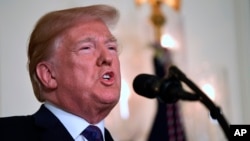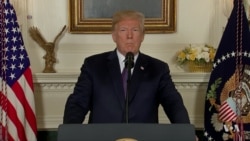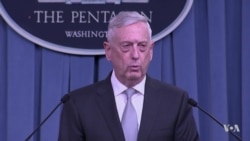President Trump announced Friday night “a combined operation” by the U.S., France and Britain against the regime of Syrian President Bashar al-Assad, aimed at ending his government’s use of chemical weapons.
As Trump spoke from the White House, explosions lit up the skies over Damascus, the Syrian capital. The assault is now over.
Associated Press reporters saw smoke rising from east Damascus and a huge fire could be seen from a distance to the east. Syrian television said the attacks targeted a scientific research center in Barzeh, near Damascus, and an army depot near Homs.
Syrian media reported that air defenses had hit 13 incoming rockets south of Damascus.
In his White House address, Trump said the U.S. was prepared to "sustain'' pressure on Assad until he ended what the president called a criminal pattern of killing his own people with internationally banned chemical weapons.
WATCH: President Trump's statement
Last week, at least 40 people were killed and hundreds were sickened in the Syrian city of Douma, in what the U.S. and other nations said was a chemical weapons attack carried out by the Syrian government. The Syrian government has repeatedly denied any use of banned weapons.
British Prime Minister Theresa May said in her country Saturday, according to Reuters, that the allied response was "not about intervening in a civil war. It is not about regime change. It is about a limited and targeted strike that does not further escalate tensions in the region and that does everything possible to prevent civilian casualties."
Congressional support
Congressional leaders are supporting the president’s decision to launch airstrikes in retaliation for an apparent chemical attack against civilians — although there are some reservations.
House Speaker Paul Ryan is praising Trump’s “decisive action in coordination with our allies,” adding, “We are united in our resolve.”
Senate Armed Service Committee Chairman John McCain is applauding the airstrikes but said “they alone will not achieve U.S. objectives in the Middle East.”
Top Senate Democrat Chuck Schumer is calling the airstrikes appropriate, but said “the administration has to be careful about not getting us into a greater and more involved war in Syria.”
And House Minority Leader Nancy Pelosi said, “One night of airstrikes is not a substitute for a clear, comprehensive Syria strategy.”
WATCH: U.S. Defense Secretary Mattis Briefs Reporters in Syria Strikes
Syria's supporters singled out
Trump singled out Syria’s biggest international supporters, Russia and Iran, for failing to stop the Syrian regime’s use of banned chemical weapons. He particularly criticized Russia for not following through on its 2013 promise to eliminate Syria's chemical weapons.
"Assad’s recent attack — and today’s response — are the direct result of Russia’s failure to keep that promise." Trump said.
The allied operation came a year after a U.S. missile strike that Trump said was meant to deter Assad from further use of chemical weapons. Since that did not work, a more intense attack would aim to degrade his ability to carry out further such attacks, and would try to do this by hitting Syrian aircraft, military depots and chemical facilities, among other things.
The one-off missile strike in April 2017 targeted the airfield from which the Syrian aircraft had launched their gas attack. But the damage was limited, and a defiant Assad returned to episodic use of chlorine and perhaps other chemicals.
Some information for this report came from Associated Press.








